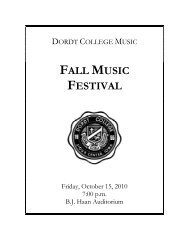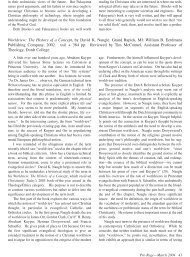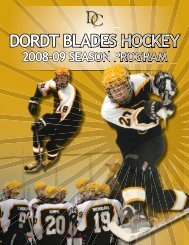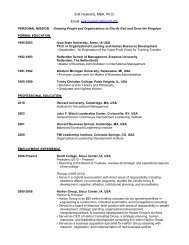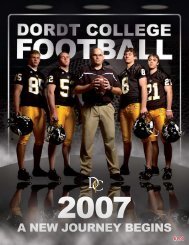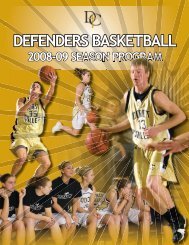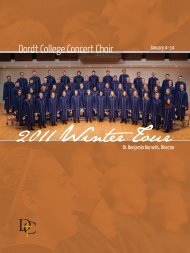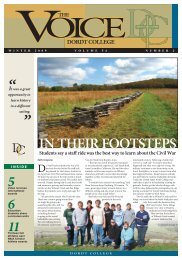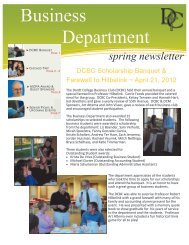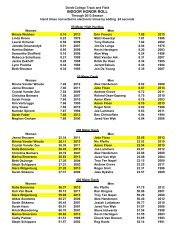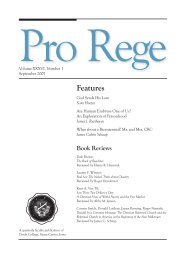June 2009 - Dordt College
June 2009 - Dordt College
June 2009 - Dordt College
Create successful ePaper yourself
Turn your PDF publications into a flip-book with our unique Google optimized e-Paper software.
Periaktoi, ellipsoidal, chiaroscuro<br />
Red herring, slippery slope and straw man<br />
Synecdoche, metonymy, hyperbole, hegemony<br />
Pistic, trophic, kinematic<br />
And that’s not even that group of distinctive<br />
words that many of you claim you are tired of:<br />
<strong>Dordt</strong> words, <strong>Dordt</strong> talk, <strong>Dordt</strong> speak, words that<br />
some of you told me not to use in this speech today.<br />
But I must say that an institution that doesn’t have<br />
a language interwoven into its course material is not<br />
worth your money. If we talked here the same way<br />
the world talks, you could have just as well spent<br />
your money somewhere else. “Religious orientation,<br />
creational structure, creational development and<br />
contemporary response” are important words to help<br />
you take your place in God’s world.<br />
It’s hard to talk about something unless we<br />
know what to name it. It’s hard to even think about<br />
something unless we know its real name. You know<br />
the story of Helen Keller, who was unable to speak,<br />
hear, or see, after a childhood sickness. But the world<br />
was opened to her when she came to understand<br />
what’s in a word, in a name. In this scene I want<br />
to read to you, Annie Sullivan, her teacher, pleads<br />
with Helen’s father to let her have more time to teach<br />
Helen that everything has a name. This scene is from<br />
the play The Miracle Worker:<br />
“Captain Keller, she has to learn that everything<br />
has its name; that words can be her eyes, to<br />
everything in the world outside her and inside<br />
too. What is she without words With them she<br />
can think, have ideas, be reached. There’s not a<br />
thought or fact in the world that can’t be hers. She<br />
has eighteen nouns and three verbs in her fingers<br />
now. I need only time to push one of them into<br />
her mind. One, and everything under the sun<br />
will follow. Oh Helen, reach! I wanted to teach<br />
you—everything the earth is full of, everything<br />
on it that’s ours for a wink and it’s gone, and what<br />
we are on it, the light we bring to it and leave<br />
behind in words; why, you can see five thousand<br />
years back in a light of words, everything we feel,<br />
think, know—and share, in words, so not a soul is<br />
in darkness, or done with, even in the grave. And<br />
I know, I know, one word and I can put the world<br />
into your hand.”<br />
The rest of the story, you may know, is that Annie<br />
Sullivan does succeed in getting into Helen’s head the<br />
awareness that the water she felt coming out of the<br />
pump was represented by the combination of letters<br />
pounded into her hand. And once she got that,<br />
Helen Keller went on to learn much, to graduate from<br />
Radcliff, to write books which included thoughts<br />
that inspire and instruct yet today. Graduates, we<br />
also wanted to teach you how to name things so that<br />
knowledge of the world, God’s world, was put into<br />
your hands to better work in His Kingdom.<br />
Another thing about naming is that when you<br />
name something, you bring it into significance. You<br />
know how worthy you feel when someone calls you<br />
by your name. But the greatest significance we can<br />
have is that given us by the God, who calls each of His<br />
creatures by name. Listen to some of these verses:<br />
“Look at the night sky,” says the Holy One. “Who<br />
do you think made all this Who marches this<br />
army of stars out each night, counts them off,<br />
calls them by name, so magnificent, so powerful,<br />
and never overlooks a single one” (Is. 40.26).<br />
It’s not just the stars. It’s his human creation as well.<br />
Is. 49:16 says “Look, I’ve written your names on the<br />
palm of my hand.” And in Rev. 2:17, “To everyone<br />
who conquers I will give . . . a white stone, and on<br />
the white stone is written a new name that no one<br />
knows except the one who receives it.” God has a<br />
name that captures you more than you even know<br />
yourself.<br />
He names us into significance, and he calls us to<br />
do the same. Rainer Maria Rilke, a poet of the late<br />
nineteenth century, wrote a set of ten long poems<br />
called The Duino Elegies, in which he poses the idea<br />
that humans are here to find the value of ordinary<br />
things and, as you see in this poem, to name them to<br />
show their value:<br />
Maybe we’re here only to say: house,<br />
Bridge, well, gate, jug, olive tree, window—<br />
At most, pillar, tower . . . but to say them,<br />
remember,<br />
Oh, to say them in a way that the things themselves<br />
Never dreamed of existing so intensely.<br />
That’s what we wanted to teach you—that an object,<br />
a person, a place, a well thought-out idea becomes<br />
worth something when you call it by its right<br />
name. What is a right name It is the name that<br />
best corresponds to reality—God’s reality and not<br />
our own clouded view of reality. It is accurate and<br />
specific, and it tells the truth.<br />
Sometimes naming the right name is beautiful,<br />
and sometimes calling something by its right name<br />
8 Pro Rege—<strong>June</strong> <strong>2009</strong>



